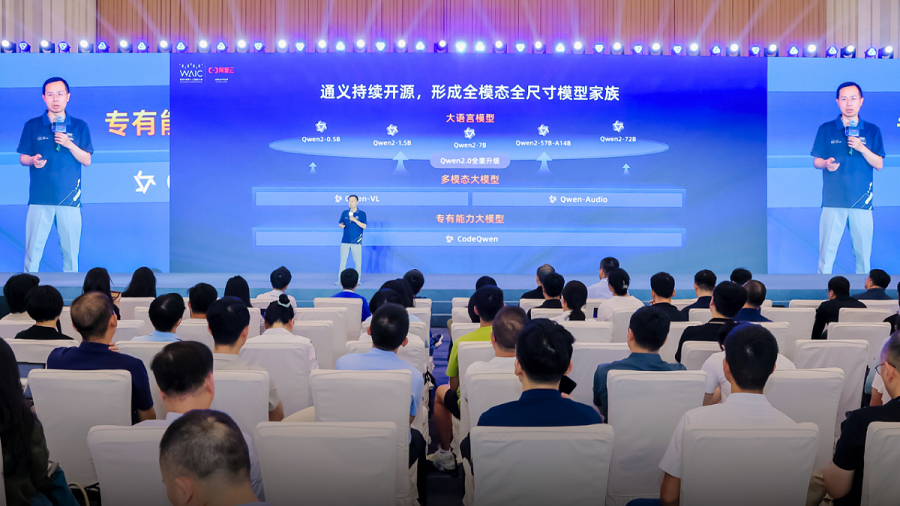
Visitors at the Alibaba booth during WAIC in Shanghai. Photo credit: Alibaba Group
A generative AI model and application development platform launched by Alibaba Cloud last year has recorded over 200,000 registrations, the cloud computing business shared during the World Artificial Intelligence Conference (WAIC) in Shanghai this week.
Model Studio enables developers to build generative AI applications by leveraging a range of large language models (LLMs), such as Alibaba Cloud’s proprietary Qwen family of models and high-caliber third-party models like Baichuan LLM.
The platform’s range of easy-to-use tools, which can assist developers with applications building and more, helped fuel the jump in user registration, with over 100,000 sign-ups in the last two months alone.
“We’re glad to see a growing number of users building a broad spectrum of innovative AI applications on Model Studio, leveraging its vast array of advanced developer tools and models,” Alibaba Cloud CTO Zhou Jingren said of the platform launched in June last year.

Zhou speaks at this year’s WAIC in Shanghai. Photo credit: Alibaba Group
WAIC runs from July 4 to 6 this year and will host over 500 companies and 200 speakers as they showcase their latest AI innovations and discuss developments across the sector.
During the conference, Alibaba Cloud also revealed that its open-sourced Qwen model series, with their industry-leading performance, recently surpassed 20 million downloads on platforms including Hugging Face and Github.
“We’re dedicated to further lowering the barriers of generative AI adoption to empower developers and businesses of all sizes to benefit,” said Zhou.
Consumer electronics company Xiaomi’s AI assistant Xiao Ai is leveraging Alibaba Cloud’s LLM Qwen to power a wider range of scenarios to enhance user experience.
Owners of Su7, Xiaomi’s new electric vehicle series, can leverage Xiao Ai to answer their questions about the vehicle’s operation, from basic operating instructions, vehicle maintenance to setting up infotainment systems to driving tips. The answers are presented in the car infotainment system in detailed text and visual formats with links to the vehicle owner’s manual, serving as the go-to guide for car owners’ vehicle use.
On Xiaomi smartphones, Xiao Ai is equipped to assist users with various aspects of product purchasing through voice and text-based interactions, including providing insights into product features, assisting with technical issue resolution, and providing customer support for consumer goods across the Xiaomi ecosystem.

Xiaomi’s AI assistant Xiao Ai leverages Qwen to power a range of scenarios. Photo credit: Alibaba Group
Leveraging general-purpose large language models such as Alibaba’s Qwen, global technology powerhouse Lenovo has made a series of cutting-edge technological innovations to deploy large foundation models on end devices.
It rolled out the industry’s first AI PCs which highlight five key features including: a personal foundation model to support an AI agent for natural interaction with users, strong local heterogeneous computing power, a personal knowledge base, an open AI application ecosystem, and robust personal data and privacy protection.
As personal computers are evolving to keep pace with the generative AI era, so are cloud computers.
At this year’s WAIC, Alibaba Cloud unveiled Wuying Xiaoying, a Qwen-powered AI assistant tailored for its Wuying Cloud Computer.
The advanced assistant offers an array of AI-powered features such as content production, response drafting, smart search and translation to enhance workplace efficiency. By examining applications running on Wuying Cloud Computer and their workflow, Xiaoying delivers scenario-specific AI features, such as automatically adding subtitles for videos, simplifying the integration of workplace AI to boost productivity.
Leveraging Alibaba Cloud’s streaming protocol and edge-cloud-device collaboration, which refers to the coordination and management of communication and data transfer between end devices and cloud resources, users can access Xiaoying’s advanced features on Wuying Cloud Computer directly from their devices.
Xiaoying will be available to customers in China starting this month, according to Alibaba Cloud.
This article was originally published on Alizila, written by Ivy Yu.
Learn more:
i Light Singapore - Alibaba Cloud's Green AI Solution Illuminates Singapore

1,076 posts | 263 followers
FollowAlibaba Cloud Community - October 9, 2024
Alibaba Cloud Community - September 20, 2024
Alibaba Cloud Community - May 9, 2024
Alibaba Clouder - January 24, 2018
Alibaba Cloud Community - June 11, 2024
Alibaba Cloud Community - October 28, 2024

1,076 posts | 263 followers
Follow Tongyi Qianwen (Qwen)
Tongyi Qianwen (Qwen)
Top-performance foundation models from Alibaba Cloud
Learn More Alibaba Cloud for Generative AI
Alibaba Cloud for Generative AI
Accelerate innovation with generative AI to create new business success
Learn More Platform For AI
Platform For AI
A platform that provides enterprise-level data modeling services based on machine learning algorithms to quickly meet your needs for data-driven operations.
Learn More AI Acceleration Solution
AI Acceleration Solution
Accelerate AI-driven business and AI model training and inference with Alibaba Cloud GPU technology
Learn MoreMore Posts by Alibaba Cloud Community